- Home
- David Downing
Silesian Station (2008) Page 28
Silesian Station (2008) Read online
Page 28
He walked on up the long canyon of grey blocks, past Goering's Air Ministry, the Reichsbahn building, Hitler's appalling new Chancellery. According to the man on the train he should be in there now, making the world a safer place for Germans. Of course, if the rumours of a nocturnal lifestyle were true, he was probably still in bed. Russell wondered what his dreams were like, whether his sleeping face was younger, more innocent. The stuff you never found in history books. The important stuff.
The Adlon Bar presented a stark contrast to the bustle outside. Slaney was sitting at his usual table, picking pastry crumbs off his tie, but the only other visible journalists were two of Mussolini's pet scribes.
'They're gone,' Slaney announced in response to Russell's bemused look. 'The Brits and French, that is. They all took trains to Denmark last night.' He lifted a large ring of keys from the table and let it drop. 'I've been left seven cars to look after.'
'Just the journalists?' Russell asked.
'Everyone but the diplomats.'
Russell sat down. 'It's coming that quickly?'
Slaney shrugged. 'Tomorrow, it looks like.
'Christ.' It was possible, he realized, to both expect an event and be surprised when it actually happened.
'The only question is whether Hitler will waste any time trying to buy off you Brits and the French. But I don't think it'll make any difference, one way or the other. He needs a war. It's the only way he can get the last one out of his system.'
Russell said nothing. He needed to talk to Paul, he realized. The schools were still out - he might be at home.
Ilse answered. 'He's out playing football with Franz and a few other friends,' she told him. 'You could try later.'
'No, I'll be seeing him tomorrow. Ilse,' he began, not sure what to say, 'Ilse, things are not looking good. Does Paul have any real idea of what's coming, what it's going to be like?'
There was a brief silence at the other end. 'Who knows?' she said eventually. 'He says all the right things. But do any of us know, really? Matthias says the people who went through the last war will all make the mistake of expecting the same, and those that didn't won't have a clue.'
It always galled him to admit it, but Matthias was probably right. He said so.
'Why don't you ask Paul tomorrow?' Ilse suggested.
'I will. We may be at war by then.'
He hung up, took his leave of Slaney, and took a tram south to Hallesches Tor. The Hanomag was still in the courtyard, its roof devoid of obvious foot-marks, and an anxious Frau Heidegger was at her usual post. She greeted him with a big smile, which made him feel good - he hadn't expected that she would hold his British ancestry against him, but you never knew.
She was, however, keen to learn the prospective enemy's intentions. 'It all seemed so clear yesterday,' she said, reaching for the dreaded coffee pot. 'Everyone thought the Pact would sort everything out. The English and the French would realize that they couldn't help the Poles, and the Poles would have to come to their senses and there'd be no need for a war. But nothing seems to have changed,' she lamented. 'The English and French won't give up their guarantee. I don't suppose they can now. It was so stupid of them to give one in the first place...'
Russell took a sip of coffee and wished he hadn't.
'When it comes down to it,' Frau Heidegger went on, 'does it really matter who owns Danzig or the Corridor? It's been twenty years and this is the first we've heard about Germans being killed in the Corridor. If they are then I suppose we have to do something about it, but it doesn't seem worth another war. Let's hope another conference can sort it out. By the way, don't forget there's another air raid rehearsal next Wednesday - Beiersdorfer will want to know if you'll be here.'
It was a timely visit from another portierfrau that set Russell free. He picked up a few clothes from his apartment - his entire wardrobe was moving across town, piece by piece - and headed back to the city centre in the Hanomag.
He and Slaney had only just finished lunch when two pieces of news filtered through to the waiting journalists in the Adlon Bar - the British Ambassador Sir Nevile Henderson had gone to see the Fuhrer and, rather more significantly, all telephone and telegraphic contacts between Germany and the outside world had been cut. As one wag put it, if Henderson and Hitler emerged naked onto the Wilhelmstrasse and danced a waltz together, there was no way of telling the world.
Russell hung around, keen to know how the meeting turned out, but the Embassy refused to release a statement, let alone answer questions, and the pointlessness of remaining became increasingly obvious. That and the danger of drinking too much ahead of their appointment with Eyebrows.
He arrived home to a transformed Effi - he had to look at her twice to make sure it was her. She had, as she'd implied, become a veritable mistress of disguise. The basics had not been changed - she was still a slim, dark-haired, reasonably young and attractive woman - but everything else had been subtly shifted. Her hair seemed thicker, her eyes darker, her nose slightly larger. She looked more like a stereotypical Jewess, he thought, which was presumably the intention.
She was dressed differently too. Neatly, but austerely. Everything about her wardrobe was slightly old-fashioned, as if the world had ended in 1933. As indeed it had, in so many ways, for Germany's Jews.
And when she got up and walked around there was an awkward defensiveness in the way she moved that bore no relation to Effi's natural grace. It was uncanny. He had seen every film she had made, but never before had he realized just how good she was.
'And now for you,' she said.
They arrived at Silesian Station an hour ahead of the train's scheduled arrival time. There was no sign of Drehsen's Mercedes in its usual spot, and no sign of the man himself on the concourse. Effi took the suitcase and hurried up the steps to the platform, leaving Russell to check that the train was running and on time. It was.
He bought a newspaper and took up position opposite the taxi rank, leaning up against the stone wall of the station. The human traffic slowly thinned as the rush hour drew to a close, the majority of faces more drawn and anxious than a Friday evening usually warranted. Most Berliners, he guessed, were going home to turn on their radios, hoping not to hear martial music and warnings of an 'important announcement'.
Fifty minutes went by with no sign of the Mercedes. Time was running out. Russell walked back into the concourse and there the man was, standing in the middle of the open space, facing the steps to the platform. Where the hell had he parked his car?
Russell hurried back out. It wasn't on the station forecourt, so where? He strode briskly down the side of the station to Koppen-Strasse, which ran under the elevated tracks at the western end. Nothing. He hesitated, looked at his watch. He only had five minutes.
A train rumbled across in the right direction, steam bellowing into the early evening sky. Too early for the Breslau train, he told himself. Another headed the same way as he walked under the bridges, this one with the reassuring hum of a Stadtbahn electric. Turning the corner he saw a short line of cars parked alongside the far side of the station. The last was a Mercedes Cabriolet, but it carried the wrong number.
Russell started running. The station side seemed to stretch forever, and he had a painful stitch in his side by the time he reached its end. Turning into Frucht-Strasse, which ran eastwards under the tracks, he saw the car. It was parked on the far corner, in - as Russell ruefully realized - the very next place that Drehsen would have tried if his usual spot had been occupied.
He was out of time, and a train was steaming into the station above him, thundering over the bridge. As he reached the car a couple of girls, prostitutes probably, walked across the end of the street, the click of their heels amplified by the iron ceiling. He stopped for a second, as if searching his pockets for cigarettes, and caught sight of a man with a moustache and slicked-back hair in the black window of a defunct shop. It was himself.
The girls gone, he took another look round, crouched down, and stabbed the
driver's side front tyre with the awl Effi had purchased that morning. There was a commendably violent hiss, and the tyre began deflating. From his other pocket he drew a small package of newspaper, gingerly removed the sharp piece of bottle glass it contained, and placed it just behind the wounded tyre. The temptation to disable the spare tyre as well, and make absolutely sure, was almost overwhelming, but he knew that would look too suspicious.
He ran down the southern side of the station, paused outside the entrance to regain his breath, and slipped back into the covered concourse through the stream of exiting passengers. Drehsen was standing in the same spot, his eyes now fixed on Effi . She was standing beside her suitcase some thirty metres away, a few paces from the bottom of the steps, anxiously scanning the concourse for her imaginary welcomer. She looked both lost and slightly angry, as if she was about to burst into tears.
Drehsen moved towards her almost apologetically, a hawk turning into a friendly owl. As she caught sight of him a hint of hope crossed Effi's face.
He let her speak first, and knowing what she intended to say, Russell had no trouble reading her lips: 'Have you come from my uncle?'
Drehsen smiled like an uncle's friend would, said a few words, and reached, almost tentatively for the suitcase. She hesitated for a second, then smiled gratefully back. He gestured towards the exit.
Russell followed them out. As they headed down the side of the station towards Frucht-Strasse he crossed the busy road beyond the taxi rank and headed along the opposite pavement, looking for any sort of concealed vantage point. He found one of the ubiquitous Der Sturmer display cabinets standing almost opposite Frucht-Strasse, and stood there pretending to enjoy the usual cartoons about Jewish bakers draining the blood from Christian children to make their matzoh.
Drehsen and Effi had reached the Mercedes, which she seemed to be admiring. He had opened the back door but Effi , as they had agreed, was insisting on sitting up front. Drehsen shrugged, put the suitcase on the back seat, and opened the front door for her. She got in.
He walked round to the driver's side and was reaching for the door handle when he saw the flat tyre. He got down on his haunches, picked up and examined the piece of glass, and dropped it again. He squatted there for a moment, presumably considering his options. Would he go for the spare?
He opened the driver's door and leaned in, talking to Effi . Was he suggesting a taxi? If not, then she would be. The exchange seemed to last a long time, but eventually he straightened his back, closed the door and went to retrieve the suitcase from the back seat. Effi got back out, and Russell found himself sighing with relief.
She and Drehsen walked back towards the taxi rank in the station fore-court, Russell keeping pace on the opposite pavement. The queue for taxis had evaporated and three were waiting in line. The driver of the leading cab took the suitcase from Drehsen and opened the rear door for Effi . Drehsen said something to him and got in on the other side.
Russell was around thirty metres ahead, close to the western throat of the forecourt. As the taxi pulled out he rushed diagonally across the road towards it, waving frantically. The driver slammed on his brakes, swerved to the right and ground to a halt inches from the kerb.
Effi erupted from the taxi. 'Uncle Fritz!' she cried happily.
'Magda,' he said. 'I'm so sorry. I was held up.'
She explained the situation to the driver, and apologised profusely for losing him his spot at the head of the line. Drehsen climbed slowly out of the back, seemingly unsure what to do, and exchanged glances with Russell. Making up his mind, he touched his cap to Effi and walked back into the station without another word.
It was what they had expected - after all, what else could he do? - but the coolness with which he did it was breathtaking.
Russell took the suitcase and they began walking the short distance to Bre-slauer Strasse, where he had left the Hanomag. Putting an arm round Effi's shoulder, he realized she was shaking. He stopped, put the suitcase down and enfolded her in a hug. She took a huge deep breath.
'All right?' he asked after a while.
'Yes,' she said. 'What a creepy man. And so convincing...'
'Did it work?' Russell interrupted her.
'Oh yes, it did. He told the cabbie Eisenacher Strasse and my heart sank, but the cabbie - God bless him - asked what number. It's 403. We were lucky really. If it hadn't been such a long street he'd never have asked.'
'You did wonderfully.'
'You too.' She reached up to kiss him. 'But the sooner we can dispense with the moustache, the better.'
'First things first,' he said, picking up the suitcase. 'We can take a look at 403 Eisenacher Strasse while Drehsen's getting his tyre changed.'
'He wanted me to wait while he changed it. And he didn't like the idea of a taxi. I had to get quite hysterical before he agreed.'
Eisenacher Strasse ran north to south across Schoneberg for almost two kilometres. Number 403 was a third of the way down, one of a row of detached three-storey houses immediately above Barbarossaplatz. It was impossible to tell which house it was - the sun had set and all were silhouetted against a deep red sky. On the other side of the road, bathed in reddish light, were a typing college and a small bookbinding factory. This part of Schoneberg had seen better days, but it still represented a considerable step up from Neukolln or Wedding. There were no tram-tracks, and not much traffic, but several modest-looking cars were parked in the spaces between the detached houses.
There was no way of stopping without drawing attention to themselves. Russell drove on to Barbarossa Platz, took the third exit, and pulled the car to a halt. 'Let's take a walk,' he said.
Three right turns brought them back onto Eisenacher Strasse, some two hundred metres above the row of houses. There were several other pedestrians on the pavement, and they fell in some twenty metres behind a uniformed young man and his girlfriend. The pair walked ever so slowly, as if intent on stretching out their time together.
The college and factory were in darkness but most of the houses had one or two lighted windows, some curtained, some not. 403 was the third from the end. Every window was curtained, and all showed lines of light. In the parking space alongside, two vehicles were drawn up, and there were two uniformed men talking in the front seats of the one nearer to the road. As they walked past one looked up, caught Russell's eye, and seemed to move them on with an almost involuntary twitch of the head.
'How,' Effi asked, when they'd walked another few paces, 'are we going to find out what's inside?'
'God knows.'
'One more look,' Effi suggested, as they reached the Hanomag.
'Why not? It's dark enough.'
Their persistence was rewarded. As the Hanomag drew level with the house the front door swung inwards, spilling yellow light down the steps to the street, and framing two uniformed men. There was a glimpse of shiny boots descending, a muffled shout of farewell. Effi twisted round in her seat to catch them under the streetlight and identify the black uniforms. 'SS,' she said, turning the consonants into a hiss.
'What a surprise,' Russell murmured. 'And emerging, unless I'm very much mistaken, from a brothel.'
'Oh no.'
'It could be a lot worse. If it is a brothel, then there's a good chance that Miriam is still alive.'
Russell woke early on Saturday morning, shut the door on the still-sleeping Effi , and waited heart in mouth as her People's Radio warmed up. When the strains of one of Beethoven's lighter sonatas emerged, he clicked off the set with a sigh of relief. No war had begun.
He went down to the Adlon to find out why.
According to the small coterie of American journalists already gathered in the bar, the answer was far from obvious. There were rumours that Mussolini had abandoned his buddy, rumours that Hitler had offered to guarantee the British Empire in return for a free hand in eastern Europe. If the latter rumours were true the Fuhrer had already had his answer - the previous afternoon the Brits and Poles had finally formalized the
British guarantee as a pact of mutual assistance.
All in all, it looked as though Hitler had pulled back from the brink. The British Ambassador had travelled to London, presumably with something new to communicate, and the telephone and telegraph connections with the outside word had been restored in the early hours of the morning. Berlin's foreign press corps could again tell the world that they hadn't a clue what was going on.
There were no Foreign Office briefings to help them out, no press releases to interpret. Russell telephoned several contacts, all of whom proved less than communicative. His colleagues had much the same experience - German officials, it seemed, were loth to confirm or deny the dates of their own birthdays. Russell wrote out his version of what was happening and wired it off, aware that it would be overtaken by events long before it reached the newspaper bins around San Francisco's Union Square.
He had lunch with Slaney - who, for the first time since Russell had met him, seemed subdued by the weight of events - and headed out to Grune-wald for his Saturday afternoon with Paul. The boy was waiting by the gate, dressed, for once, in normal clothes.
'No Jungvolk meeting?' Russell asked as his son got into the car.
'Yes, there was, but it ended early. I had time to change.'
He'd had time before, and hadn't changed, but Russell decided not to probe. 'What shall we do?'
'Can we just go for a drive? Out of the city, I mean. Take a walk in the woods or something.'
'All right.' Russell thought for a moment. 'How about the Brauhausberg?' he asked. They could take the Avus Speedway most of the way, and take one of the southbound exits before Potsdam.
'That would be good,' Paul agreed, though without a great deal of enthusiasm. 'If America comes into the war, will you be arrested?' he asked abruptly.
Russell waited at a crossroads while a line of troop lorries drove past. 'No, I'd just have to leave Germany. Like the British and French journalists have done.'

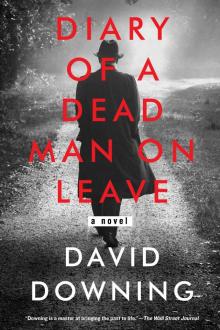 Diary of a Dead Man on Leave
Diary of a Dead Man on Leave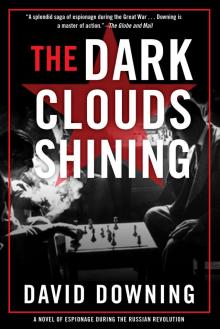 The Dark Clouds Shining
The Dark Clouds Shining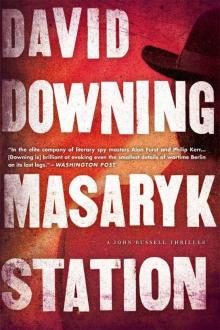 Masaryk Station (John Russell)
Masaryk Station (John Russell)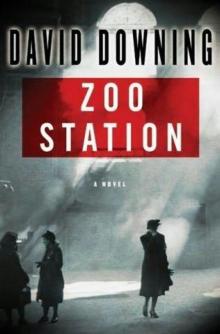 Zoo Stationee
Zoo Stationee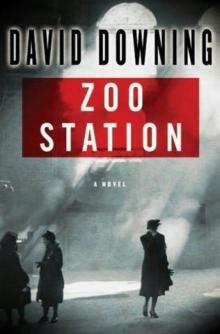 Zoo Station jr-1
Zoo Station jr-1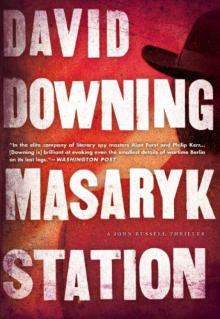 Masaryk Station
Masaryk Station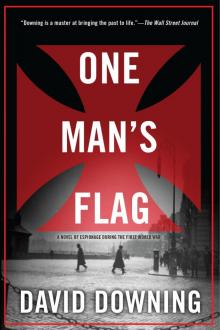 One Man's Flag
One Man's Flag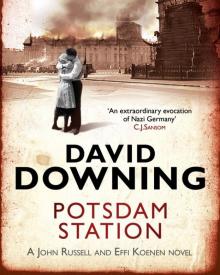 Potsdam Station jr-4
Potsdam Station jr-4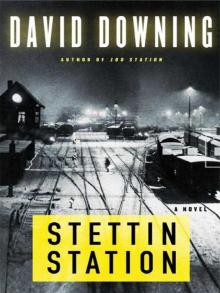 Stattin Station jr-3
Stattin Station jr-3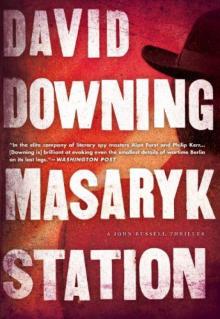 Masaryk Station jr-6
Masaryk Station jr-6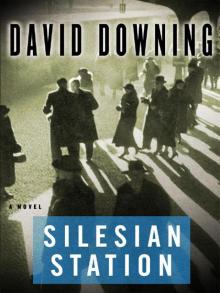 Silesian Station (2008) jr-2
Silesian Station (2008) jr-2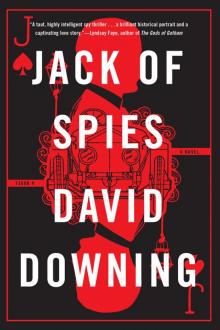 Jack of Spies
Jack of Spies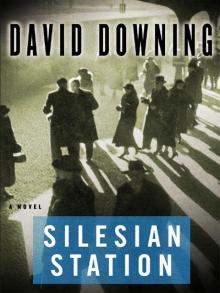 Silesian Station (2008)
Silesian Station (2008) The Moscow Option
The Moscow Option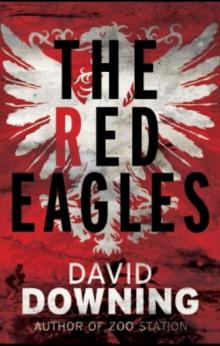 The Red Eagles
The Red Eagles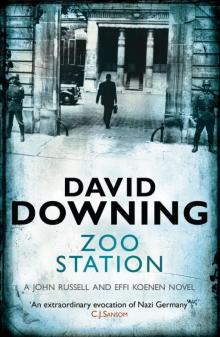 Zoo Station
Zoo Station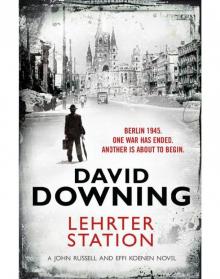 Lehrter Station
Lehrter Station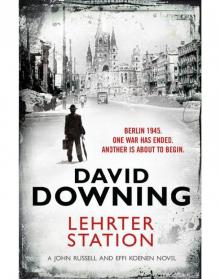 Lehrter Station jr-5
Lehrter Station jr-5